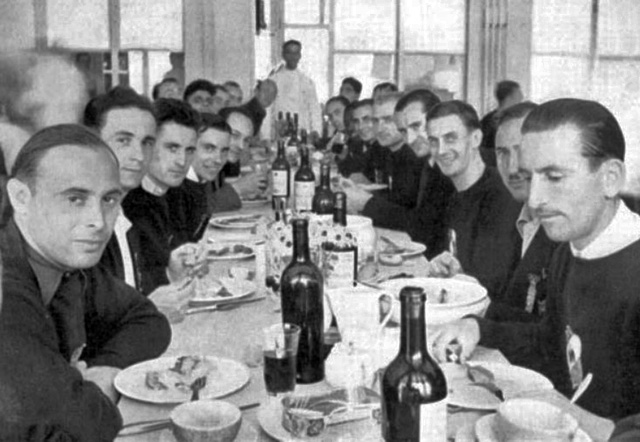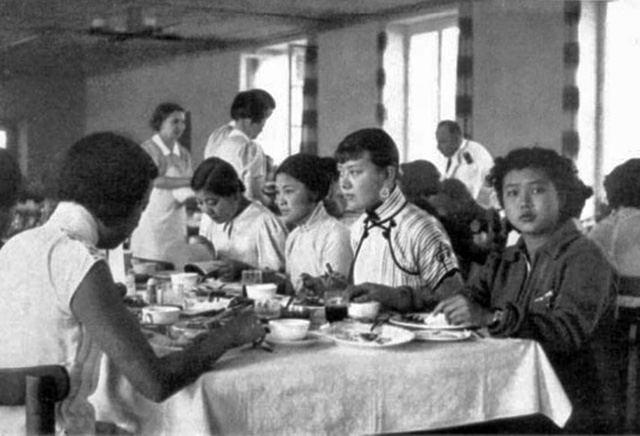Here is some information about the Olympic Village food hall and menu for Berlin in 1936. With athletes coming from around the world, the food supplied needs to cater to cater to a diversity of sports, cultures, ages and special dietary needs. See more about Olympic Village nutrition and links to information about the food supplied at other Olympic Games.
1936 Berlin Olympic Village
An Olympic Village (Olympisches Dorf) for men was established at Doberlitz, about 14 kilometers from Berlin. In addition to 140 houses for accommodation, the Village included administrative and technical buildings, and 40 different sized dining halls to suit the different teams. Females were accommodated separately, in student dormitories at the Olympic Park.
The Basic Menu
Here was the basic plan for the daily meal service at the Olympic Village. As you will see later, many nations had unique requirements and modifications were made to this menu for specific groups.
Breakfast:
Fruit
Oatmeal or rice with milk
American cereals
Coffee, tea, milk, cocoa
Butter, honey, marmalade
Eggs prepared as desired
Bread, rolls, toast.
Lunch:
Soup or bouillon
Meat, fresh vegetables, potatoes
Green salad
Fruit, cheese or dessert.
Dinner:
Cold or warm bouillon
Fish, steak, cold cuts
Vegetables, potatoes, green salad
Fowl twice weekly
Fruit
Tea, cold or warm milk.
No Alcohol? No Way!
It is reported that Hitler banned alcohol from the Olympic Village, though permission was given for the French and Italian athletes to be served wine with their meals, and after protests the Dutch and Belgian squads were allowed to have beer.
 The French team enjoying their wine with their meal
The French team enjoying their wine with their mealfrom the Olympic Games Official Report Berlin 1936
National Variations
Several of the foreign teams brought provisions with them, such as Japan sending spices and soy as well as preserved vegetables. Many nations also brought their own chefs. Menus were provided in English, French, Spanish and German for the different dining rooms.
Special Requests!
Here is a list of special requests from a range of national teams. It is an interesting insight of the diets of different countries around the world. These requests were accommodated as much as possible.
- Argentina: Three meat dishes daily with large portions.
- Australia: English cooking; beef, mutton and veal preferred; three meat dishes daily.
- Austria: Biomalt.
- Finland: Ample quantities of milk.
- France: Hors d'oeuvres instead of soup or broth at lunch.
- Germany: Tomato juice, cream cheese with linseed oil; Ovaltine, Dextropur, Dextroenergen.
- Greece: Cold or warm Ovaltine at all meals.
- Holland: Warm meals only in the evening; ample quantities of vegetables, potatoes and fresh salads; for
breakfast, Dutch cheese; for lunch, cold cuts of various kinds, sausages, eggs, Dutch cheese, bread
and butter.
- India: Curry, meats including mutton, veal, lamb and fowl but no beef, pork or beef suet.
- Poland: Cold or warm Ovaltine for breakfast and dinner.
- Switzerland: Ovaltine at every meal.
- U.S.A.: Ovaltine, Dextroenergen.
- Yugoslavia: Dishes cooked in oil.
In addition, some individual athletes requested specific foodstuffs. Special preparations were issued only with the approval of the team leader or physician. These consisted principally of Ovaltine, Dextropur, Dextroenergen and Biomalt.
 Food service at the women's accommodation
Food service at the women's accommodationfrom the Olympic Games Official Report Berlin 1936
Women's Dormitories
The women's accommodation did not have the luxury of separate kitchens for each nation. An extremely varied menu was provided in attempt to satisfy all wishes.
Source: THE OFFICIAL REPORT OF THE ORGANISING COMMITTEE FOR THE GAMES OF THE XV OLYMPIAD Berlin 1936
Related Pages
- Olympic Village nutrition, includes links to information about the menu at other Olympic Games.
- Nutrition at the Olympics
- History of the Olympic Games Athlete Villages
- Sport in Germany
- Nutrition for Athletes at Major Events


 Current Events
Current Events